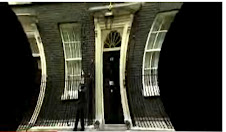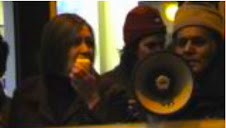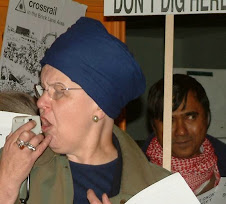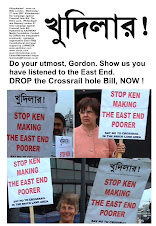"
© Independent Television News Limited 2008.
Brown branded 'worse than Blair' in new poll
Updated 22.48 Mon Apr 07 2008
Keywords: Gordon Brown, Tony Blair
Gordon Brown is regarded as a worse prime minister than Tony Blair by nearly a third of voters, according to a poll.
The Populus survey also shows the Tories' lead over Labour growing by three percentage points in the last month.
Populus found that 31 per cent of the public feels the Prime Minister is worse than his predecessor, Mr Blair
It found that support for the Conservatives has risen two points to 39 per cent, while Labour has fallen one to 33 per cent.
The Liberal Democrats are down two on 17 per cent.
Populus found that 31 per cent of the public feels the Prime Minister is worse than his predecessor, Mr Blair.
© Independent Television News Limited 2008. All rights reserved.
"
Monday, April 7, 2008
Will CRASSrail hole plot-tout Ken Livingstone NOW confess to the world class lies he has been telling for Big Business?
Will CRASSrail hole plot-tout Ken Livingstone NOW confess to the world class lies he has been telling for Big Business?
"
Brown branded 'worse than Blair' in new poll
Updated 22.48 Mon Apr 07 2008
Keywords: Gordon Brown, Tony Blair
Gordon Brown is regarded as a worse prime minister than Tony Blair by nearly a third of voters, according to a poll.
The Populus survey also shows the Tories' lead over Labour growing by three percentage points in the last month.
Populus found that 31 per cent of the public feels the Prime Minister is worse than his predecessor, Mr Blair
It found that support for the Conservatives has risen two points to 39 per cent, while Labour has fallen one to 33 per cent.
The Liberal Democrats are down two on 17 per cent.
Populus found that 31 per cent of the public feels the Prime Minister is worse than his predecessor, Mr Blair.
© Independent Television News Limited 2008. All rights reserved.
"
"
Brown branded 'worse than Blair' in new poll
Updated 22.48 Mon Apr 07 2008
Keywords: Gordon Brown, Tony Blair
Gordon Brown is regarded as a worse prime minister than Tony Blair by nearly a third of voters, according to a poll.
The Populus survey also shows the Tories' lead over Labour growing by three percentage points in the last month.
Populus found that 31 per cent of the public feels the Prime Minister is worse than his predecessor, Mr Blair
It found that support for the Conservatives has risen two points to 39 per cent, while Labour has fallen one to 33 per cent.
The Liberal Democrats are down two on 17 per cent.
Populus found that 31 per cent of the public feels the Prime Minister is worse than his predecessor, Mr Blair.
© Independent Television News Limited 2008. All rights reserved.
"
Diana Inquest jury has defied the 'law and media' trades' servile role to the state in the UK -a crisis of constitutionality confirmed
By©Muhammad Haque
1615 Hrs GMT
London
Monday 7 April 2008
Diana Inquest jury has defied the 'law and media' trades' servile role to the state in the UK -
The jury verdict has been a significant one, even though in his first published response, Dodi Al Faye's father, ''Mohamed' [one of the variations of the spelling that eh has allowed]' Al Fayed has reportedly been disappointed.
The defiance by the jury of the mass brainwashing programme - that Diana and Dodi were 'killed in an accident' shows that given the necessary scope, the 'jury' that is to ay, ordinary people, can act against the orchestrated might and forces of the trading media and the trading professionals, time-servers and careerists in the field of ‘legal practice and law’.
As I pointed out in my post on the UK Indymedia within half an hour of the jury verdict being published, the Jury is going to be made the subject of hostile comments in the media.
The reason why that will be the case is to be found in the unhealthy, undemocratic, immoral and the in ordinate relationship that exists between the so-called fourth state, that is the media in Britain and the secretive agencies and forces agencies.
1615 Hrs GMT
London
Monday 7 April 2008
Diana Inquest jury has defied the 'law and media' trades' servile role to the state in the UK -
The jury verdict has been a significant one, even though in his first published response, Dodi Al Faye's father, ''Mohamed' [one of the variations of the spelling that eh has allowed]' Al Fayed has reportedly been disappointed.
The defiance by the jury of the mass brainwashing programme - that Diana and Dodi were 'killed in an accident' shows that given the necessary scope, the 'jury' that is to ay, ordinary people, can act against the orchestrated might and forces of the trading media and the trading professionals, time-servers and careerists in the field of ‘legal practice and law’.
As I pointed out in my post on the UK Indymedia within half an hour of the jury verdict being published, the Jury is going to be made the subject of hostile comments in the media.
The reason why that will be the case is to be found in the unhealthy, undemocratic, immoral and the in ordinate relationship that exists between the so-called fourth state, that is the media in Britain and the secretive agencies and forces agencies.
'The Olympic Spirit'? That question is a definite slap aimed at the craven face of the careerist Ken Livingstone, who has oversold 2012 staging
Muhammad Haque, Organiser, Khoodeelaar! the Brick Lane, Whitechapel, Bethnal Green ‘south’ and Stepney London E1 Area Campaign against Big Business Crossrail lies agenda of deliberately lying and speaking about regeneration when in fact engaged in implementing an agenda of degeneration, dislocation and devastation: 1025 Hrs GMT London monday 7 April 2008:
'The Olympic Spirit'? That question is a definite slap aimed at the craven face of the careerist Ken Livingstone, who has oversold the 'benefits' of the 'Olympics Games staging' adventures 2012 London...
'The Olympic Spirit'? That question is a definite slap aimed at the craven face of the careerist Ken Livingstone, who has oversold the 'benefits' of the 'Olympics Games staging' adventures 2012 London...
For the first time, apart from Khoodeelaar! another platform carries some of the evidence about Livingstone's lying for Big Business CRASSrail
By©Muhammad Haque
0930 Hrs GMT
London
Monday 7 April 2008
In this interview with the London INDEPENDENT [see full piece we quote in this piece] CROSSRAIl hole plot-backer Livingston is confessing to confusion.
And to much more...
l.... We shall be examining the entire piece in the Independent, during the day today Monday 7 April 2008
AADHIKARonline continuing to report against the corruption of London public life by Ken Livingstone [the 'current mayor' 'in the name of and at tee expense of the people of London] quoting from the web site of the London INDEPENDENT newspaper, at 0920 Hrs GMT on monday 7 April 2008
"
The men who would be Mayor: Power and the people
It's all about big personalities and even bigger budgets – with bendy buses, bikes and bitter vendettas thrown in for good measure. With just 24 days to go until Londoners cast their votes, John Walsh gets under the skin of the three contenders for the capital
AP
Ken Livingstone: ' I'd rather have the nanny state than the collapse of civilisation because of climate change. Anyway, the English have always liked being disciplined by nannies'
MORE PICTURES
Related Articles
Labour asks for Lib Dem help to beat Johnson
Print Email
Search
Go
Independent.co.uk Web
Bookmark & Share
Digg It
del.icio.us
Facebook
Stumbleupon
What are these?
Change font size: A A A
Monday, 7 April 2008
We're in Eldon Junior School in Edmonton, in the wastes of north London. In the headmistress's office, Ken Livingstone is listening to the voters of the future. Beneath gnomes and gonks, six children and three teachers sit with the mayor around a table covered with apples, shortbread biscuits and energy graphs. One child explains their husbandry of four birdhouses. Another tells him how they dig in the school garden. The teachers reassure the mayor about the school's "eco-trips" and energy-saving initiatives. Not that they need to – Eldon junior has received awards for its environmental initiatives.
The mayor, "a sixty-year-old smiling public man" (as WB Yeats described himself in his poem "Among School Children") in a charcoal grey suit and undone tie, is relaxed. "You ever been to Spain?" he asks them. "How was it? Hot?" The children nod eagerly. "Well, by the time your children leave school," he tells them, "London will be as hot as that. So we'll have to plant new trees to make shade, or people will die."
The children stoically digest this gloomy prognosis. A sweet girl in a wide Alice band switches the conversation to composting. "I always make my own compost," says Livingstone, "I don't buy it at the garden centre." He tells them about energy-efficient lightbulbs and how he plans to give one free to every London household. He tells them about his "retrofitting" scheme, and how he's going to reform every public building in the metropolis – every bus station, fire station, school and public library – to make them more energy-efficient. "We won't spend money on the new lighting," he says. "We'll just give the energy companies 80 per cent of the reduction in the building's energy bill."
The children look blank. Fearing he may have gone over their heads, the mayor tells the children to go home and tell their parents that henceforth there will be no need to flush the toilet when they've had a wee.
"Here at the school," says a teacher, "it's a fine balance between how often you flush and how bad the odour gets."
"Well, I wouldn't leave it over the weekend," says the mayor with a smile. Later, Livingstone talks about the Olympics and the flower bouquets to be given to each winner. Ken has a plan to "make bouquets of flowers out of household waste. I've seen some and they look really nice." Five minutes later, he's back on sewage recycling and how "the water you drink has been drunk by lots of other people right back to the dinosaurs". The children look bemused, as well they might when confronted by this kindly man who talks with such animation about people dying, weeing and waste. On the wall, one of the inspirational classroom signs bears the legend: Be a Litter Hitter. To my presbyopic eyes, it seems to read: "Be a Little Hitler."
****
Livingstone, 63 in June, has been regarded by many as a little Hitler for much of his eight years in power. For others he has been a go-getting, forward-thinking man of the people.
His achievements have been considerable since, in 2000, he became the first executive mayor of a city whose previous mayors had been conspicuous only for glass coaches and pet cats. He brought the world the congestion charging zone, to reduce congestion and raise funds for investment, in February 2003. It was copied worldwide. He virtually created "gay marriages", setting up Britain's first register for gay couples in 2001, which led to the Civil Partnership Act three years later. He played a key role in securing London as the site of the 2012 Olympics. He benefitted thousands of travellers by introducing the one-day and one-week travelcards, allowing unlimited access to buses, trains or Tubes and the Oyster smartcard system, which obviates the need to queue for bus and Tube tickets.
A zealous anti-racist, he apologised in 2007 for the role London played in the international slave trade of previous centuries, and called for an annual slavery memorial day. And when London was shaken by suicide bombers on 7 July 2005, he sent citizens of the metropolis an emotional rallying-cry of a speech, at one point addressing the bombers: "Nothing you do, however many of us you kill, will stop that flight to our city where freedom is strong and where people can live in harmony with one another. Whatever you do, however many you kill, you will fail."
For all these achievements, he has managed to infuriate as many Londoners as he has impressed. Though some motorists felt the congestion charge scheme was a boon to the daytime traveller who didn't mind paying the £5 (later £8), others hated it. Motorists who drove in town before 6pm and forgot to pay found themselves faced with a £40 (later £50) fine through the post, which quickly doubled if they still neglected to pay. The application of such a financial armlock dented his popularity.
His extension of the zone to west London rang alarm bells that more and more sectors of the metropolis would extract a penalty from drivers. His introduction of beneficial ticketing for frequent users of public transport coincided with his raising fares for one-off users: going one or two zone-one Tube stops costs an astounding £4. Bus travellers without an Oyster or Travelcard had to grapple with a £2 ticket machine, usually just as the bus was approaching.
And he came under fire last December, when the Evening Standard investigated his adviser on race, Lee Jasper, and discovered apparent financial irregularies: the London Development Agency had poured money into organisations (such as Brixton Base) connected to black Londoners. Allegations of fraud and "cronyism" flew, and £1.6m, for funding six "projects", remained unaccounted for. Jasper resigned, Scotland Yard investigated but found no case to answer. The mayor dismissed the inquiry as a racist witch-hunt and promised to reinstate Jasper in the new administration.
But a taint of corruption remains, along with the suspicion that Livingstone is a little unfortunate with his lieutenants: his Tube adviser, Bob Kiley, hired for a salary in millions, told the Evening Standard he [Kiley] was a drunk who did very little work all day. Jasper's priapic emails to Karen Chouhan, the married director of a group that benefited from his patronage, were leaked to amused Londoners.
And Livingstone's cosying up to Sheikh Yusuf al-Qaradawi of the Muslim Brotherhood, who recommends that homosexuals be stoned to death, led to resignations from members of his staff. Nick Cohen, in The Observer, called Livingstone "the greatest hypocrite in modern politics: a 'left winger' who ducks the challenge when faced with misogyny, homophobia, theocracy and the slaughter of innocents".
He is a man of combative instincts who gets into scrapes. His combative streak emerges as we walk to an interview room. "We don't have to do the interview here," he says, "we could do it on the train back to London."
"I can't," I say. "I've got my car here." He cocks a horrified eyebrow. "A car?" "It's an Alfa Romeo. I don't know if it's one of the ones in Band G, which are going to be charged £25 a day..."
"Don't worry," grates the mayor. "You soon will."
I ask him about the old mayoral priorities when he took over in 2000, and how they've changed. He says they haven't.
"When we were drafting the manifesto in 2000, I remember saying, 'I don't think any government's going to take any serious action on climate change until tens of millions are dead.' Now environmental groups estimate that about 100,000 people every year die from climate change. The world has started waking up, so I'm less pessimistic." He talks proudly about his "retrofitting" scheme in public buildings, an idea cooked up at a convention of city mayors from Delhi, Mumbai, Shanghai, Chicago, New York, Sao Paolo and Cairo, who used their vast collective purchasing muscle to strike a deal with Honeywell, the engineering conglomerate, in return for its receiving a hefty share of the energy saving.
I point out that he'd tried a similar home insulation scheme with British Gas – and it hadn't been a big success. He sighs.
"The trouble is getting people to do it. We made this offer, that you could, in effect, get £1,200-worth of cavity wall and loft insulation at half that price, and you'd recover the cost within about 15 months. Just a few thousand people come forward. We thought, do we make it free for everyone, because the saving in emission terms is worth doing? But even if we do, unless you tell them it has to be done or say you'll get money off your council tax bill if you do it, people need pressure to do something."
This is a classic Livingstone line, telling people what's good for them and demanding they do it. "Barnet Council, which is usually an abomination, threatened to charge a fine of £1,000 to people who didn't use their recycling bin. And recycling figures went up from 30 to 60 per cent overnight! And I think they fined three people!" Coercion, it seems, works if it's in a good cause.
Since we are in Edmonton, where four teenagers have been killed this year (11 in the whole of London by the end of March) I ask what the mayor can tell the borough about violence, and gangs. "I grew up in the city," he says – he was born in Lambeth in June 1945, the son of a merchant navy captain and a dancer – "there were always gangs. The difference is, it's becoming increasingly easy for kids to get hold of guns and knives. Operation Trident arrested most of the black-on-black gun crime, and we got nearly 200 people who were also mainly involved in drugs. But we found another element – a disaffected group of kids. We know that 80 per cent of people who come into the criminal justice system are excluded from school. Youth clubs used to operate in the evenings and at weekends, and sports clubs where they burnt off their energy. But they also found among the boys an adult male whom they didn't argue with, and he would have a mentoring role, but it's gone now. So for the kids there was little to do except hang out in the streets. They were caught up in gangs because there was nothing else. But now Ed Balls has given us £59m, and we've added £20m from the LDA, to double the level of clubs. So we're paying for more youth clubs, expanding existing ones, across all the 32 boroughs. It will have a huge impact on the kids."
A thoughtful, surprisingly passionate man when talking about crime and families, Livingstone will drone for hours about buses ("We've got the most environmentally sustainable bus fleet on the planet," he says, at one high point) and carbon emissions and his beloved congestion charge. He sees the environment as the core issue of the mayoral elections and, apart from his retrofitting programme, his big new idea is to charge motorists with "band G" cars – those emitting more than 225g per kilometre of CO2 – £25 a day for driving in central London. It sounds, to hostile ears, as if he simply wants to penalise the rich or the greedy, or anyone who owns a Jeep Cherokee and has the nerve to drive it in London. How does he answer the criticism that he is a merciless, tyrannical bully towards people not wholly committed to public transport?
"I'm not saying you can't have a car," he said with equanimity. "But what's the point of having an engine that can get up to 150mph in 10 seconds, when everywhere in London we have 20 and 30mph zones? You're allowed to drive at more than 30 mph in only 1 per cent of London streets. But if you trade down from band G to band F, you reduce your annual running costs by 60 per cent." He smiled in a kindly way. What fools people are. If only they took the sensible option. "Petrol used to be cheap. Now petrol's never going to be cheap again. It makes sense to be on top of these issues; you can save yourself a fortune."
Apart from the flood of statistics, it's that matey, smiley dirigiste strain in Livingstone's thinking that drives you nuts. Does he not recognise how enraging it is for people to be told they have to save themselves a fortune? That something is more sensible, therefore they must do it? Isn't he the living embodiment of the nanny state? Livingstone grins again. "I'd rather have the nanny state than the collapse of human civilisation in the middle of this century, because climate change carries on and violent weather makes life intolerable. And anyway, the English have always liked being disciplined by nannies."
The other major issue that exercises the mayoral incumbent is Crossrail, the eight-year mega-project, jointly owned by Transport for London (TfL) and the Department for Transport, for new east-west railway connections under London, running from Maidenhead and Heathrow to Essex and Kent. Gordon Brown gave approval last November, and it is the largest transport project in Europe, with a budget of £16bn. This is not an issue to be taken lightly, but Livingstone is using Crossrail as a test of character.
On 20 March, he uttered a Cassandra-like warning: "If Crossrail is got right, it will add 10 per cent to London's public transport capacity. If it is got wrong, it can devastate London's finances to the extent that it has huge knock-on effects for fares, business rates and for the ability to afford police and other services. I am not being alarmist when I say that if Crossrail were to go wrong you are looking at 30 per cent increases in fares and doubling of supplementary business rates." Behind this (alarmist) broadside lies a simple warning: "Let a certain B Johnson get his hands on Crossrail and we're all doomed." Is that the case?
"In the wrong hands, it could go so badly wrong. If the cost overruns by 25 per cent, it could precipitate a mini-recession."
Surely if it is so scary, it should be reviewed – especially after the disaster of Metronet, the Tube clean-up project that concluded with an overspend of £2bn.
"No, it's done. The legislation is about to go through Parliament and the deal's clear, the Government is giving £5.5bn towards the £16bn, business is giving a third and the farepayer carries the other third, but the Government is devolving it to the mayor. So when the next mayor starts on 4 May, first thing that lands on his desk is to make sure Crossrail works. The most difficult choice Boris Johnson ever had to make at The Spectator was where to go for lunch. He's never managed any capital projects."
Livingstone is seldom far away from a dig at his Conservative opponent, who proved such an unexpected challenge. "Where else except Britain," he demands in his famous Lambeth whine, "do people get to run something as big as London without any administrative experience? Go to Germany, people have to work their way up through city councils and beyond. Tony Blair spent his first term as PM learning how to do the job. That's a luxury you don't have in this city."
I remark that it must be tough for a man with a large metropolitan vision to spend his time dealing with clanking engineering projects and the public's complaints about tiny issues. He turns in his schoolmistress's chair, and looks straight at me for the first time. "But that's how I've spent my life in politics. I remember the first time I was in Cuba, I went to see the local MP in a suburb of Havana. He was giving his monthly report, as they all have to. The MP got up and spoke about American imperialism and the struggle in Angola. Then the people spoke – and all the questions were about potholes in the road, and leaking roofs. No one cared about American imperialism. You have a vision of where you want the city to be in 20 years' time. But unless you run with what people's concerns are, they're not going to listen to you. So you have to find a way of saying, 'This is our vision – now, how do we get the people's concerns into that forward progression?'"
****
My own forward progression takes me to Golders Green Police Station, where Brian Paddick, the nation's former top gay cop, now the Liberal Democrats' mayoral candidate, is scheduled to meet locals. Inside the station, a young copper has no idea where Paddick is. I tell him it is an electioneering opportunity, rather than an actual police matter. "Oh right," he says. "We had that other one last week – you know, whatsisname, Tory Boy."
Outside, I try ringing Paddick's minders, then realise that, among a small knot of people outside a DVD store, a familiar figure is standing. Tall, handsome, ramrod of posture, slightly thinning grey hair cut just so, Paddick at 49 is a fine advertisement for a life spent fighting crime across the metropolis. He looks terribly healthy and chiselled and straight from the gym. There is nothing the least bit camp about him, scarcely a flicker on one's mental gaydar, as we shake hands. In his Gucci suit, tapering to the ankles, he could pass for a (straight) male model of an unusually firm disposition.
Paddick spent a neat 30 years in the force. Born in Balham, he grew up in Tooting Bec, whence he hauled himself to a degree in PPE at Queen's College, Oxford. An MBA at Warwick Business School was paid for by a police scholarship and, with a Cambridge diploma in policing and applied criminology, he joined the Met in 1976. From constable to riot squad, he was a sergeant by the time of the Brixton riots in 1981, an inspector two years later, then chief inspector in Brixton. He joined the CID at Notting Hill, and hit the dizzy heights of chief superintendent of Scotland Yard's personnel department. In 2000, he was made police commander for Ken Livingstone's old manor, Lambeth, and hit the headlines for telling officers under him not to charge people found with marijuana or cannabis; to give them a warning and confiscate the drug but not press charges. Otherwise, he argued, officers would spend all their time on paperwork for minor misdeeds, which could be spent looking for heroin and cocaine suppliers.
In 2005, he was in charge of Territorial Policing across all 32 boroughs of London when the suicide bombs went off – and when a jumpy firearms unit shot Jean Charles de Menezes on the Tube at Stockwell. After the shooting, Paddick seriously fell out with his Met bosses. He told a tribunal that one of Metropolitan Police Commissioner Sir Ian Blair's aides knew, or believed, that the wrong man was being targeted six hours before the shooting. This was denied by Scotland Yard. Someone was telling lies, or covering up and it wasn't supposed to be the Met's sainted commissioner. So Paddick was kicked upstairs and given a non-job. His career with the police was over.
He resigned in May last year and threw his hat in the mayoral ring in November, as the Lib Dems' golden candidate. To those who wondered about his political bona fides, he said, "I have been someone with liberal leanings for a very long time, and so my natural home is the Liberal Democrats." (He'd been a party member for 18 months, but used to be one 10 years ago.)
Paddick is unimpressed by the present mayor's contention that crime has fallen by 17 per cent in the past four years. "The British Crime Survey is the most reliable survey of crimes committed over time," he says. "That survey shows that, over the past four years, crime hasn't gone down at all. People have less and less faith in the police, and fewer and fewer report a crime. That's why reported crime has gone down 17 per cent. The reporting, not the crime, has decreased."
Paddick comes close, at times, to calling Livingstone a liar. "The mayor is very good at details. Last night, he said that, under him, traffic-light phasing had increased by only two or three seconds on any set of lights. And I was immediately able to show that he wasn't telling the truth. He appears to know the details, but he makes up most of it."
He's also scornful of Livingstone's proud boast that he will put "a thousand more police" on London streets. "But the Government says it won't support a thousand extra officers for London, it will support 800, and this will not be funded by the mayor's office but by the Home Office. At the end of the day, central government is funding these posts and would have done so, no matter who the mayor is." So there.
He is as clear-sighted as you'd expect about the spate of youth killings. "There's a two-part solution. First, get the knives and guns off the streets. We need targeted police stop-and-searches to take weapons away from young people. Only 14 in every 100 searches are for knives and guns. Most are for trivial offences such as possession of small amounts of cannabis. Because if an officer seizes some cannabis and warns someone on the street, that counts as an offence brought to justice. An 18-month successful murder investigation also counts only one point on the government score sheet. It's no surprise that a police chief tells his officers, 'Get as many people for cannabis as you can,' rather than searching for guns and knives.
"Second, local people are losing their trust in the police and we must address that. There's no point in having a knife or gun if nobody sees it. Hundreds of law-abiding citizens know who has the knife, who has the gun, and we need to build that trust back with local police, then people can accurately target stop-and-search on those people who have the weapons."
Paddick is an earnest fellow with a finely developed sense of right and wrong. Moral probity shines from him. One recalls the scandalous weekend in 2003, when The Mail on Sunday ran a story, given them by a vengeful ex-inamorato called James, that Paddick was a habitual cannabis fiend and a practising anarchist. He sued the paper for libel and won damages.
Although he's never been a politician, he has picked up some of the rhetoric. He tells you that his job is to walk round London listening to what Londoners are saying, and gleaning their priorities and most pressing needs. It's a hackneyed old trope among politicians who have yet to refine their policy ideas, but it offers a fatally folksy image of the immaculately dressed Paddick standing on street corners from Acton to Shoreditch, cocking an ear to the complaints of the unwashed, and nodding sagely in sympathy.
On the congestion charge, he rejects Livingstone's £25 gas-guzzler levy because, "I'm against the measures surrounding it. Ken is exempting Band A and B [low emissions] cars from the charge. How will that encourage fewer people to drive their cars into London? How will that encourage people to use public transport rather than their own car? The package of measures will increase congestion and therefore increase pollution."
Paddick would scrap the western extension of the congestion zone, "because two thirds of the people there say they don't want it, and I believe the mayor should be listening to the people and doing as they want, not as he pleases". Instead of fining drivers for non-payment, "People would be billed in arrears for travelling through the zone, so you get a bill after it's reached £40 or so. You don't get a fine for £100, because you've forgotten to pay."
Would he make any vehicles exempt? "Well, I think we have to differentiate between essen
tial journeys and non-essential ones. Someone in their Bentley Convertible, who likes driving into central London because it's more comfortable than taking the train, they should pay a significant charge, but a lorry delivering supplies to a hospital – well, it's ridiculous that it should pay the same amount."
Things take a surreal turn as we discuss his vision of London as a zone driven entirely by public transport. Paddick wants to eliminate bendy buses, and the fare-dodging that accompanies them. And he'd replace them with...? "Trams," he says, with conviction, as if it were an option on every candidate's lips. "They're environmentally friendly, they carry twice as many people as bendy buses and they're predictable – people know where they're going to go, because the tracks are in the road. And as passengers find public transport becoming more reliable, they'll make a logical choice to use it. If we're going to tackle climate change, we must encourage people to do the right thing rather than impose draconian fines."
But Brian (I cry) – TRAMS? In central London? Wouldn't it cost a fortune just to lay the tracks? "I've spoken to the chief executive of Tramtrack Croydon," says Paddick calmly. "He's done the sums and, on a busy commuter route, over 10 years trams would be less expensive than bendy buses."
It is as if the mayoral candidate had said, "I met this bloke in a pub the other day, and he swears blind it would work."
Later, he confides his plan for powering the Tube by renewable energy. How would that work? "We've proposed building a wind farm in the Thames estuary, which could power London Underground." A wind farm to power the Tube? Blimey. That would take a hell of a breeze....
As we part, I ask about his 50th birthday on 24 April, a week before the election. Will he be dancing at the Substation South club in Brixton, where he's been seen many times? "I'm going to celebrate it by doing Question Time with Ken and Boris," he says, unsmiling. You worry about what Paddick will do after 2 April, with the rest of his life to kill.
****
On a dull Friday afternoon, I'm outside County Hall, waiting to meet Boris Johnson. County Hall is a cheeky choice of venue, since it's where, in the 1980s, Ken Livingstone used to run the Greater London Council, that, eventually, was to become the Greater London Authority. But you expect cheek from Boris.
Now so famous that he needs no surname, he has become a kind of licensed political jester. His journalism in The Spectator and Daily Telegraph was orotund, euphuistic and confident, but it was his delivery in public that made the nation regard him with wonder. It was his voice, that whuffling, blustering, I-don't-know-what-I'm-saying-but-I'll-go-on-saying-it-anyway baritone rumble. It was his shy smile. It was his curious straw-like blond hair. It was his occasional disgorging of perfectly judged, Augustan remarks ("My friends, as I have discovered myself, there are no disasters, only opportunities. And, indeed, opportunities for fresh disasters.")
By some sleight of hand, Johnson has contrived to have half the nation saying he is a right-wing pillock, and the other half reassuring the first half that he is a scheming, super-intelligent genius, playing a long game.
He was born Alexander Boris de Pfeffel Johnson in New York in June 1964. According to family tradition, his ancestor, Ali Kemal, a Turkish journalist, served in the government of Ahmed Tevfik Pasha, the Grand Vizier of the Ottoman Empire. Boris's Turkish great-grandparents came to England in 1909 and lived in Wimbledon. During the First World War they were given British citizenship and took the name Johnson, the grandmother's maiden name. Boris was educated in Brussels (his father, Stanley, was an MEP) then Eton. He read classics at Balliol, Oxford, was president of the Union and became a member of the notorious Bullingdon Club with David Cameron. As we have recently learnt, he experimented with cocaine at 19, but suspected it might have been icing sugar.
After Oxford, he became perhaps the world's least convincing management consultant, before discovering journalism. He was sacked from The Times for making up a quote and joined The Daily Telegraph as leader and feature writer. From there he graduated to editing The Spectator in 1999 and stayed in the agreeable environs of Bloomsbury, after he became MP for Henley-on-Thames in June 2001. But he had to give up the editorial chair in 2005 when he joined the Shadow Cabinet as spokesman on higher education.
Meanwhile, he won a place in the nation's consciousness by appearing on TV's Have I Got News For You seven times. Invited as a soft Tory target for the wit of Ian Hislop and Paul Merton, Johnson outflanked them by refusing to take the programme seriously. The highlight of his appearances was when his mobile phone rang. Boris answered it on-air, and produced the line, "I – I – I can't really talk now. I'm on television." Merton and Hislop looked on in amazement. Could this guy be serious?
Mayoral voters must ask themselves the same thing. Does Boris deserve to run London plc? Does he have policies in which Londoners can believe? Would he be any good in a crisis?
Henley's MP is shorter than I expected but also bulkier. He has extremely long blond eyelashes, and really does preface remarks with a fusillade of I-I-Is.
We talk about the crisis at Heathrow and he goes straight into Tough Candidate mode. "Heathrow is a disgrace – and where is our present mayor? It's appalling that people's first experience of London should be this. The mayor should be speaking up about it – as I will."
Aviation isn't within the purview of the mayor, but Boris believes anything that affects Londoners needs attention. There's no reason at all why BAA should have a monopoly on London's airports. We should split it up."
There, in just a few minutes, is the problem with Johnson. You listen to his loud, stagily emphatic voice denouncing this or that iniquity, and cannot help wondering if he cares a row of buttons about the BAA monopoly – or, indeed, knew before last week that it existed. It's not that he appears not to care about issues; just that you suspect that his lines have been learnt.
Does he like campaigning without having to parrot party policy? "It's been fantastic fun so far, a massive amount of detail but endlessly rewarding and interesting and fantastically intricate. Every twiddle you make, about road space or housing, everything you decide to re-ration in one way potentially disadvantages someone else. But one thing I've been convinced of is that it was right to have a mayor."
Like Paddick, he locates the core of mayoral concern as crime. "The number one thing going wrong is that the present incumbent isn't leading the fightback against disorder, right across the spectrum, through violence, mugging, assaults, to teenage gang killings. Why do people pile into their cars and ferry their kids to school? Because the streets are dangerous. We've all got kids who've been pursued down the street, or worried about having their Oyster card and their mobiles snatched. The MP who represents me – Emily Thornbury, she's Labour, Islington South and Finsbury, said there's barely a teenager in her constituency who hasn't been mugged.
"We're becoming paranoid. I send my kids on the Tube and people say, 'Ooh, you shouldn't do that.'" Boris waits to see if his own apparent unconcern for his children's safety has been noted. He is given to contradiction. At one point he says, "We're more scared than we need to be, but maybe scared with reason." But he believes, a little idealistically, that crime-free neighbourhoods will flourish. "Areas that are cruddy and run down suddenly become safer, because people invest in them. Parks that are vulnerable to gangs, suddenly become places that are safe and become cherished, and protected. All kinds of benefits flow if you get crime right."
He's keen on putting knife-scanning equipment into schools and CCTV cameras on buses "to stop kids using them as glorified getaway cars." Like Livingstone, he believes in encouraging youth clubs and the like to balance the rootlessness of teenagers' lives in depressed communities.
"There's a boxing academy on the Holloway Road, full of kids happily engaged in belting the life out of each other." Presumably making themselves more effective muggers? "No," says Johnson firmly. "They learn discipline, emotional maturity, they learn defeat and failure and how to deal with them in an adult way. It's amazing. It really changes their lives, every week.
"It would be a great thing if I was able to encourage the voluntary sector and mobilise the huge sums of money that are still being made in London. That's why I'm going to set up a Mayor's Fund for London, for people who are making huge sums to contribute to clubs and drama groups."
One question asked by Johnson's enemies, especially Livingstone, is how the Flaxen Charmer will handle the harsh world of serious committees, billion-dollar projects, transport expertise. Will a man whose main area of learning is classical Greece and Rome be able to make meaningful choices and decisions about huge metropolitan matters? Boris winces when I ask if he's really equipped to chair the Metropolitan Police Authority. "I get on very well with policemen," he offers. "There'll be people working with me who'll give me advice about what we need to do, but my priorities are very clear."
How about Crossrail? Johnson responds to Livingstone's condescending remarks about him with magnificent fury. "Livingstone says the project is so dangerous, it's like a great bomb that only he can defuse. He's already presided over incredible financial disasters. Look at the London Development Agency, where there has been an unbelievable haemorrhaging of money. If he's such a brilliant minder of the pennies, can the mayor supply the full audit trail for the missing millions which have either been lost or trousered by his cronies? If this man is such a master of detail, I should like to know what's happened to that.
"And if he has such a brilliant grip on budgets, what about the Olympics budget which has tripled on his watch without a single brick of the stadium being built? His argument is that only he can run Crossrail. I'd say he is the last person who should be put in charge of a serious project like Crossrail. What we need is an independent arbiter to guarantee taxpayer value and guarantee that TfL is not continually ripped off by the contractors. The real terror in what Livingstone has devised is that, if there are cost overruns, the London taxpayer will be responsible."
This is the new Boris, master of financial detail, sultan of fighting rhetoric, scourge of lefties. His friends in the right-wing press have been busily writing about "the new Boris" – how he's changed from a clown to an homme sérieux. Happily, there are touches of the old Boris, as when he describes Livingstone as a "this great geyser of hypocrisy" who "squats like the dragon, the great Smaug, on taxpayers' loot".
Johnson believes in using the carrot rather than the stick in persuading people to recycle more. If we went round to his home in Islington, would we find it a recycling paradise? "I now hesitate," he says sleekly, "for a long time after I've licked the yoghurt lid, to work out which container to put it into." He drives an old Toyota people carrier, not a Prius, "because they're very expensive." Though 19 years younger than Livingstone, here's something nicely old-fashioned about his concern for building "affordable" new houses that are "beautiful" and have gardens. Also for his devotion to the old Routemaster buses, with conductors and bells that go "ting ting". He will fund their return, he says, by eliminating bureaucracy. "There's £110m being spent on consultants for TfL. Given the choice between £110m on consultants and on conductors, I think people would rather have fewer consultants."
But Boris, I say – buses are so not you. Why you want to condemn yourself to having to make decisions about engineering works and traffic lights? Why do you want to become mayor at all?
His reply is on-message, about "trying to make a difference to the quality of the urban environment" but you sense, behind the bluster, a kind and fundamentally decent man becoming comprehensively out of his depth in hard-nose, hard-hat local politics.
****
The mayoral race has polarised since it began in earnest. Brian Paddick, on paper the perfect compromise candidate, stands little chance. The battle for London has become a two-horse race between a twice-elected mayor whose bullying of motorists and choices of advisers have made him few friends; and a charismatic public entertainer with no track record in running anything larger than a magazine, whose persona of hapless, bumbling-along ignorance has made him far too many. Unless the election is conducted as a personality contest, the choice before Londoners is an almost impossible one.
Ken's Policies
Transport
A new £25 charge for the worst-polluting vehicles, along with the continuation of Tube modernisation; free 24-hour travel for pensioners and the extension of discounted travel for students and people with disabilities; an extra £600m investment in buses each year; implementation of the £16bn Crossrail investment for a new east-west underground line; and a £500m cycling and walking scheme.
Crime
Over the next year, 1,000 extra police officers on the beat; a higher priority given to combating antisocial behaviour; an investment of £79m over two years in youth centres and services.
Housing
A minimum of 50,000 new "affordable" homes in the next three years, constituting a £1bn investment.
Environment
All public buildings to be made more energy efficient; extended low-emission zone; no new Heathrow runway.
Brian's policies
Transport
Scrap £25 charge for most polluting cars and the Low Emission Zone. Revenue from the Congestion Charge (£3.5bn a year) to be spent on public transport, including new tram and rail links. Allow pre-pay Oyster cards to be used for unlimited bus journeys within an hour. Free 24-hour travel extended to pensioners and all students. An additional £50m to be spent on cycle lanes. Introduce a bicycle rental system similar to the Velib scheme in Paris.
Crime
"Real action" to tackle gun and knife crime, including tougher sentences. Cut crime by 20 per cent in the next four years.
Housing
Divert money currently paid to private landlords for temporary family housing to bring unoccupied homes into use through compulsory purchase. Build on publicly owned brownfield sites.
Environment
According to his website, not yet known.
Boris's policies
Transport
Bendy buses to be phased out; a competition to find a 21st-century Routemaster with conductors and full disabled access, running on clean fuel. Prevent Tube disruption by negotiating a no-strike deal. Reform the Congestion Charge. Better cycle routes; £2m invested in safe bicycle parking. Free 24-hour travel for OAPs.
Crime
Funding for 440 extra community police officers to patrol buses. Community and youth projects to give young people "a realisation of their value". Hand-held scanners and knife archways at transport hubs; crime maps.
Housing
Partnership with local councils to increase affordable homes. More family-sized homes with gardens. Protect London's historic buildings.
Environment
Supports the Low Emission Zone. Zero tolerance of littering and graffiti. No new runway at Heathrow.
****
Not keen on Ken, Boris or Brian? There are seven other candidates...
* Sian Berry (Green) plans bus and off-peak Tube fare cuts, a bicycle rental scheme and free home insulation.
* Richard Barnbrook (BNP) plans to "remove" the million immigrants in London to combat crime and improve housing and transport.
* Gerard Batten (UKIP) refuses to "pander" to multiculturalism and "special interest" groups, and will end the congestion and emission charges.
* Alan Craig (Christian Choice) believes that mending broken homes is the key to solving issues of crime, underachievement and drug abuse.
* Winston McKenzie (Independent) will be "merciless" on gun and knife crime and set up youth projects.
* Lindsey German (Left List) thinks council housing is the answer to the homes shortage. She will restore bus conductors and Tube guards.
* Matt O'connor (English Democrats) will take a zero-tolerance approach to gang culture and violent crime. He wants to "rebuild our fractured families".
Interesting? Click here to explore further
"
AADHIKARonline continuing to report against the corruption of London public life by Ken Livingstone [the 'current mayor' 'in the name of and at tee expense of the people of London] unquoting from the web site of the London INDEPENDENT newspaper, at 0920 Hrs GMT on monday 7 April 2008
0930 Hrs GMT
London
Monday 7 April 2008
In this interview with the London INDEPENDENT [see full piece we quote in this piece] CROSSRAIl hole plot-backer Livingston is confessing to confusion.
And to much more...
l.... We shall be examining the entire piece in the Independent, during the day today Monday 7 April 2008
AADHIKARonline continuing to report against the corruption of London public life by Ken Livingstone [the 'current mayor' 'in the name of and at tee expense of the people of London] quoting from the web site of the London INDEPENDENT newspaper, at 0920 Hrs GMT on monday 7 April 2008
"
The men who would be Mayor: Power and the people
It's all about big personalities and even bigger budgets – with bendy buses, bikes and bitter vendettas thrown in for good measure. With just 24 days to go until Londoners cast their votes, John Walsh gets under the skin of the three contenders for the capital
AP
Ken Livingstone: ' I'd rather have the nanny state than the collapse of civilisation because of climate change. Anyway, the English have always liked being disciplined by nannies'
MORE PICTURES
Related Articles
Labour asks for Lib Dem help to beat Johnson
Print Email
Search
Go
Independent.co.uk Web
Bookmark & Share
Digg It
del.icio.us
Stumbleupon
What are these?
Change font size: A A A
Monday, 7 April 2008
We're in Eldon Junior School in Edmonton, in the wastes of north London. In the headmistress's office, Ken Livingstone is listening to the voters of the future. Beneath gnomes and gonks, six children and three teachers sit with the mayor around a table covered with apples, shortbread biscuits and energy graphs. One child explains their husbandry of four birdhouses. Another tells him how they dig in the school garden. The teachers reassure the mayor about the school's "eco-trips" and energy-saving initiatives. Not that they need to – Eldon junior has received awards for its environmental initiatives.
The mayor, "a sixty-year-old smiling public man" (as WB Yeats described himself in his poem "Among School Children") in a charcoal grey suit and undone tie, is relaxed. "You ever been to Spain?" he asks them. "How was it? Hot?" The children nod eagerly. "Well, by the time your children leave school," he tells them, "London will be as hot as that. So we'll have to plant new trees to make shade, or people will die."
The children stoically digest this gloomy prognosis. A sweet girl in a wide Alice band switches the conversation to composting. "I always make my own compost," says Livingstone, "I don't buy it at the garden centre." He tells them about energy-efficient lightbulbs and how he plans to give one free to every London household. He tells them about his "retrofitting" scheme, and how he's going to reform every public building in the metropolis – every bus station, fire station, school and public library – to make them more energy-efficient. "We won't spend money on the new lighting," he says. "We'll just give the energy companies 80 per cent of the reduction in the building's energy bill."
The children look blank. Fearing he may have gone over their heads, the mayor tells the children to go home and tell their parents that henceforth there will be no need to flush the toilet when they've had a wee.
"Here at the school," says a teacher, "it's a fine balance between how often you flush and how bad the odour gets."
"Well, I wouldn't leave it over the weekend," says the mayor with a smile. Later, Livingstone talks about the Olympics and the flower bouquets to be given to each winner. Ken has a plan to "make bouquets of flowers out of household waste. I've seen some and they look really nice." Five minutes later, he's back on sewage recycling and how "the water you drink has been drunk by lots of other people right back to the dinosaurs". The children look bemused, as well they might when confronted by this kindly man who talks with such animation about people dying, weeing and waste. On the wall, one of the inspirational classroom signs bears the legend: Be a Litter Hitter. To my presbyopic eyes, it seems to read: "Be a Little Hitler."
****
Livingstone, 63 in June, has been regarded by many as a little Hitler for much of his eight years in power. For others he has been a go-getting, forward-thinking man of the people.
His achievements have been considerable since, in 2000, he became the first executive mayor of a city whose previous mayors had been conspicuous only for glass coaches and pet cats. He brought the world the congestion charging zone, to reduce congestion and raise funds for investment, in February 2003. It was copied worldwide. He virtually created "gay marriages", setting up Britain's first register for gay couples in 2001, which led to the Civil Partnership Act three years later. He played a key role in securing London as the site of the 2012 Olympics. He benefitted thousands of travellers by introducing the one-day and one-week travelcards, allowing unlimited access to buses, trains or Tubes and the Oyster smartcard system, which obviates the need to queue for bus and Tube tickets.
A zealous anti-racist, he apologised in 2007 for the role London played in the international slave trade of previous centuries, and called for an annual slavery memorial day. And when London was shaken by suicide bombers on 7 July 2005, he sent citizens of the metropolis an emotional rallying-cry of a speech, at one point addressing the bombers: "Nothing you do, however many of us you kill, will stop that flight to our city where freedom is strong and where people can live in harmony with one another. Whatever you do, however many you kill, you will fail."
For all these achievements, he has managed to infuriate as many Londoners as he has impressed. Though some motorists felt the congestion charge scheme was a boon to the daytime traveller who didn't mind paying the £5 (later £8), others hated it. Motorists who drove in town before 6pm and forgot to pay found themselves faced with a £40 (later £50) fine through the post, which quickly doubled if they still neglected to pay. The application of such a financial armlock dented his popularity.
His extension of the zone to west London rang alarm bells that more and more sectors of the metropolis would extract a penalty from drivers. His introduction of beneficial ticketing for frequent users of public transport coincided with his raising fares for one-off users: going one or two zone-one Tube stops costs an astounding £4. Bus travellers without an Oyster or Travelcard had to grapple with a £2 ticket machine, usually just as the bus was approaching.
And he came under fire last December, when the Evening Standard investigated his adviser on race, Lee Jasper, and discovered apparent financial irregularies: the London Development Agency had poured money into organisations (such as Brixton Base) connected to black Londoners. Allegations of fraud and "cronyism" flew, and £1.6m, for funding six "projects", remained unaccounted for. Jasper resigned, Scotland Yard investigated but found no case to answer. The mayor dismissed the inquiry as a racist witch-hunt and promised to reinstate Jasper in the new administration.
But a taint of corruption remains, along with the suspicion that Livingstone is a little unfortunate with his lieutenants: his Tube adviser, Bob Kiley, hired for a salary in millions, told the Evening Standard he [Kiley] was a drunk who did very little work all day. Jasper's priapic emails to Karen Chouhan, the married director of a group that benefited from his patronage, were leaked to amused Londoners.
And Livingstone's cosying up to Sheikh Yusuf al-Qaradawi of the Muslim Brotherhood, who recommends that homosexuals be stoned to death, led to resignations from members of his staff. Nick Cohen, in The Observer, called Livingstone "the greatest hypocrite in modern politics: a 'left winger' who ducks the challenge when faced with misogyny, homophobia, theocracy and the slaughter of innocents".
He is a man of combative instincts who gets into scrapes. His combative streak emerges as we walk to an interview room. "We don't have to do the interview here," he says, "we could do it on the train back to London."
"I can't," I say. "I've got my car here." He cocks a horrified eyebrow. "A car?" "It's an Alfa Romeo. I don't know if it's one of the ones in Band G, which are going to be charged £25 a day..."
"Don't worry," grates the mayor. "You soon will."
I ask him about the old mayoral priorities when he took over in 2000, and how they've changed. He says they haven't.
"When we were drafting the manifesto in 2000, I remember saying, 'I don't think any government's going to take any serious action on climate change until tens of millions are dead.' Now environmental groups estimate that about 100,000 people every year die from climate change. The world has started waking up, so I'm less pessimistic." He talks proudly about his "retrofitting" scheme in public buildings, an idea cooked up at a convention of city mayors from Delhi, Mumbai, Shanghai, Chicago, New York, Sao Paolo and Cairo, who used their vast collective purchasing muscle to strike a deal with Honeywell, the engineering conglomerate, in return for its receiving a hefty share of the energy saving.
I point out that he'd tried a similar home insulation scheme with British Gas – and it hadn't been a big success. He sighs.
"The trouble is getting people to do it. We made this offer, that you could, in effect, get £1,200-worth of cavity wall and loft insulation at half that price, and you'd recover the cost within about 15 months. Just a few thousand people come forward. We thought, do we make it free for everyone, because the saving in emission terms is worth doing? But even if we do, unless you tell them it has to be done or say you'll get money off your council tax bill if you do it, people need pressure to do something."
This is a classic Livingstone line, telling people what's good for them and demanding they do it. "Barnet Council, which is usually an abomination, threatened to charge a fine of £1,000 to people who didn't use their recycling bin. And recycling figures went up from 30 to 60 per cent overnight! And I think they fined three people!" Coercion, it seems, works if it's in a good cause.
Since we are in Edmonton, where four teenagers have been killed this year (11 in the whole of London by the end of March) I ask what the mayor can tell the borough about violence, and gangs. "I grew up in the city," he says – he was born in Lambeth in June 1945, the son of a merchant navy captain and a dancer – "there were always gangs. The difference is, it's becoming increasingly easy for kids to get hold of guns and knives. Operation Trident arrested most of the black-on-black gun crime, and we got nearly 200 people who were also mainly involved in drugs. But we found another element – a disaffected group of kids. We know that 80 per cent of people who come into the criminal justice system are excluded from school. Youth clubs used to operate in the evenings and at weekends, and sports clubs where they burnt off their energy. But they also found among the boys an adult male whom they didn't argue with, and he would have a mentoring role, but it's gone now. So for the kids there was little to do except hang out in the streets. They were caught up in gangs because there was nothing else. But now Ed Balls has given us £59m, and we've added £20m from the LDA, to double the level of clubs. So we're paying for more youth clubs, expanding existing ones, across all the 32 boroughs. It will have a huge impact on the kids."
A thoughtful, surprisingly passionate man when talking about crime and families, Livingstone will drone for hours about buses ("We've got the most environmentally sustainable bus fleet on the planet," he says, at one high point) and carbon emissions and his beloved congestion charge. He sees the environment as the core issue of the mayoral elections and, apart from his retrofitting programme, his big new idea is to charge motorists with "band G" cars – those emitting more than 225g per kilometre of CO2 – £25 a day for driving in central London. It sounds, to hostile ears, as if he simply wants to penalise the rich or the greedy, or anyone who owns a Jeep Cherokee and has the nerve to drive it in London. How does he answer the criticism that he is a merciless, tyrannical bully towards people not wholly committed to public transport?
"I'm not saying you can't have a car," he said with equanimity. "But what's the point of having an engine that can get up to 150mph in 10 seconds, when everywhere in London we have 20 and 30mph zones? You're allowed to drive at more than 30 mph in only 1 per cent of London streets. But if you trade down from band G to band F, you reduce your annual running costs by 60 per cent." He smiled in a kindly way. What fools people are. If only they took the sensible option. "Petrol used to be cheap. Now petrol's never going to be cheap again. It makes sense to be on top of these issues; you can save yourself a fortune."
Apart from the flood of statistics, it's that matey, smiley dirigiste strain in Livingstone's thinking that drives you nuts. Does he not recognise how enraging it is for people to be told they have to save themselves a fortune? That something is more sensible, therefore they must do it? Isn't he the living embodiment of the nanny state? Livingstone grins again. "I'd rather have the nanny state than the collapse of human civilisation in the middle of this century, because climate change carries on and violent weather makes life intolerable. And anyway, the English have always liked being disciplined by nannies."
The other major issue that exercises the mayoral incumbent is Crossrail, the eight-year mega-project, jointly owned by Transport for London (TfL) and the Department for Transport, for new east-west railway connections under London, running from Maidenhead and Heathrow to Essex and Kent. Gordon Brown gave approval last November, and it is the largest transport project in Europe, with a budget of £16bn. This is not an issue to be taken lightly, but Livingstone is using Crossrail as a test of character.
On 20 March, he uttered a Cassandra-like warning: "If Crossrail is got right, it will add 10 per cent to London's public transport capacity. If it is got wrong, it can devastate London's finances to the extent that it has huge knock-on effects for fares, business rates and for the ability to afford police and other services. I am not being alarmist when I say that if Crossrail were to go wrong you are looking at 30 per cent increases in fares and doubling of supplementary business rates." Behind this (alarmist) broadside lies a simple warning: "Let a certain B Johnson get his hands on Crossrail and we're all doomed." Is that the case?
"In the wrong hands, it could go so badly wrong. If the cost overruns by 25 per cent, it could precipitate a mini-recession."
Surely if it is so scary, it should be reviewed – especially after the disaster of Metronet, the Tube clean-up project that concluded with an overspend of £2bn.
"No, it's done. The legislation is about to go through Parliament and the deal's clear, the Government is giving £5.5bn towards the £16bn, business is giving a third and the farepayer carries the other third, but the Government is devolving it to the mayor. So when the next mayor starts on 4 May, first thing that lands on his desk is to make sure Crossrail works. The most difficult choice Boris Johnson ever had to make at The Spectator was where to go for lunch. He's never managed any capital projects."
Livingstone is seldom far away from a dig at his Conservative opponent, who proved such an unexpected challenge. "Where else except Britain," he demands in his famous Lambeth whine, "do people get to run something as big as London without any administrative experience? Go to Germany, people have to work their way up through city councils and beyond. Tony Blair spent his first term as PM learning how to do the job. That's a luxury you don't have in this city."
I remark that it must be tough for a man with a large metropolitan vision to spend his time dealing with clanking engineering projects and the public's complaints about tiny issues. He turns in his schoolmistress's chair, and looks straight at me for the first time. "But that's how I've spent my life in politics. I remember the first time I was in Cuba, I went to see the local MP in a suburb of Havana. He was giving his monthly report, as they all have to. The MP got up and spoke about American imperialism and the struggle in Angola. Then the people spoke – and all the questions were about potholes in the road, and leaking roofs. No one cared about American imperialism. You have a vision of where you want the city to be in 20 years' time. But unless you run with what people's concerns are, they're not going to listen to you. So you have to find a way of saying, 'This is our vision – now, how do we get the people's concerns into that forward progression?'"
****
My own forward progression takes me to Golders Green Police Station, where Brian Paddick, the nation's former top gay cop, now the Liberal Democrats' mayoral candidate, is scheduled to meet locals. Inside the station, a young copper has no idea where Paddick is. I tell him it is an electioneering opportunity, rather than an actual police matter. "Oh right," he says. "We had that other one last week – you know, whatsisname, Tory Boy."
Outside, I try ringing Paddick's minders, then realise that, among a small knot of people outside a DVD store, a familiar figure is standing. Tall, handsome, ramrod of posture, slightly thinning grey hair cut just so, Paddick at 49 is a fine advertisement for a life spent fighting crime across the metropolis. He looks terribly healthy and chiselled and straight from the gym. There is nothing the least bit camp about him, scarcely a flicker on one's mental gaydar, as we shake hands. In his Gucci suit, tapering to the ankles, he could pass for a (straight) male model of an unusually firm disposition.
Paddick spent a neat 30 years in the force. Born in Balham, he grew up in Tooting Bec, whence he hauled himself to a degree in PPE at Queen's College, Oxford. An MBA at Warwick Business School was paid for by a police scholarship and, with a Cambridge diploma in policing and applied criminology, he joined the Met in 1976. From constable to riot squad, he was a sergeant by the time of the Brixton riots in 1981, an inspector two years later, then chief inspector in Brixton. He joined the CID at Notting Hill, and hit the dizzy heights of chief superintendent of Scotland Yard's personnel department. In 2000, he was made police commander for Ken Livingstone's old manor, Lambeth, and hit the headlines for telling officers under him not to charge people found with marijuana or cannabis; to give them a warning and confiscate the drug but not press charges. Otherwise, he argued, officers would spend all their time on paperwork for minor misdeeds, which could be spent looking for heroin and cocaine suppliers.
In 2005, he was in charge of Territorial Policing across all 32 boroughs of London when the suicide bombs went off – and when a jumpy firearms unit shot Jean Charles de Menezes on the Tube at Stockwell. After the shooting, Paddick seriously fell out with his Met bosses. He told a tribunal that one of Metropolitan Police Commissioner Sir Ian Blair's aides knew, or believed, that the wrong man was being targeted six hours before the shooting. This was denied by Scotland Yard. Someone was telling lies, or covering up and it wasn't supposed to be the Met's sainted commissioner. So Paddick was kicked upstairs and given a non-job. His career with the police was over.
He resigned in May last year and threw his hat in the mayoral ring in November, as the Lib Dems' golden candidate. To those who wondered about his political bona fides, he said, "I have been someone with liberal leanings for a very long time, and so my natural home is the Liberal Democrats." (He'd been a party member for 18 months, but used to be one 10 years ago.)
Paddick is unimpressed by the present mayor's contention that crime has fallen by 17 per cent in the past four years. "The British Crime Survey is the most reliable survey of crimes committed over time," he says. "That survey shows that, over the past four years, crime hasn't gone down at all. People have less and less faith in the police, and fewer and fewer report a crime. That's why reported crime has gone down 17 per cent. The reporting, not the crime, has decreased."
Paddick comes close, at times, to calling Livingstone a liar. "The mayor is very good at details. Last night, he said that, under him, traffic-light phasing had increased by only two or three seconds on any set of lights. And I was immediately able to show that he wasn't telling the truth. He appears to know the details, but he makes up most of it."
He's also scornful of Livingstone's proud boast that he will put "a thousand more police" on London streets. "But the Government says it won't support a thousand extra officers for London, it will support 800, and this will not be funded by the mayor's office but by the Home Office. At the end of the day, central government is funding these posts and would have done so, no matter who the mayor is." So there.
He is as clear-sighted as you'd expect about the spate of youth killings. "There's a two-part solution. First, get the knives and guns off the streets. We need targeted police stop-and-searches to take weapons away from young people. Only 14 in every 100 searches are for knives and guns. Most are for trivial offences such as possession of small amounts of cannabis. Because if an officer seizes some cannabis and warns someone on the street, that counts as an offence brought to justice. An 18-month successful murder investigation also counts only one point on the government score sheet. It's no surprise that a police chief tells his officers, 'Get as many people for cannabis as you can,' rather than searching for guns and knives.
"Second, local people are losing their trust in the police and we must address that. There's no point in having a knife or gun if nobody sees it. Hundreds of law-abiding citizens know who has the knife, who has the gun, and we need to build that trust back with local police, then people can accurately target stop-and-search on those people who have the weapons."
Paddick is an earnest fellow with a finely developed sense of right and wrong. Moral probity shines from him. One recalls the scandalous weekend in 2003, when The Mail on Sunday ran a story, given them by a vengeful ex-inamorato called James, that Paddick was a habitual cannabis fiend and a practising anarchist. He sued the paper for libel and won damages.
Although he's never been a politician, he has picked up some of the rhetoric. He tells you that his job is to walk round London listening to what Londoners are saying, and gleaning their priorities and most pressing needs. It's a hackneyed old trope among politicians who have yet to refine their policy ideas, but it offers a fatally folksy image of the immaculately dressed Paddick standing on street corners from Acton to Shoreditch, cocking an ear to the complaints of the unwashed, and nodding sagely in sympathy.
On the congestion charge, he rejects Livingstone's £25 gas-guzzler levy because, "I'm against the measures surrounding it. Ken is exempting Band A and B [low emissions] cars from the charge. How will that encourage fewer people to drive their cars into London? How will that encourage people to use public transport rather than their own car? The package of measures will increase congestion and therefore increase pollution."
Paddick would scrap the western extension of the congestion zone, "because two thirds of the people there say they don't want it, and I believe the mayor should be listening to the people and doing as they want, not as he pleases". Instead of fining drivers for non-payment, "People would be billed in arrears for travelling through the zone, so you get a bill after it's reached £40 or so. You don't get a fine for £100, because you've forgotten to pay."
Would he make any vehicles exempt? "Well, I think we have to differentiate between essen
tial journeys and non-essential ones. Someone in their Bentley Convertible, who likes driving into central London because it's more comfortable than taking the train, they should pay a significant charge, but a lorry delivering supplies to a hospital – well, it's ridiculous that it should pay the same amount."
Things take a surreal turn as we discuss his vision of London as a zone driven entirely by public transport. Paddick wants to eliminate bendy buses, and the fare-dodging that accompanies them. And he'd replace them with...? "Trams," he says, with conviction, as if it were an option on every candidate's lips. "They're environmentally friendly, they carry twice as many people as bendy buses and they're predictable – people know where they're going to go, because the tracks are in the road. And as passengers find public transport becoming more reliable, they'll make a logical choice to use it. If we're going to tackle climate change, we must encourage people to do the right thing rather than impose draconian fines."
But Brian (I cry) – TRAMS? In central London? Wouldn't it cost a fortune just to lay the tracks? "I've spoken to the chief executive of Tramtrack Croydon," says Paddick calmly. "He's done the sums and, on a busy commuter route, over 10 years trams would be less expensive than bendy buses."
It is as if the mayoral candidate had said, "I met this bloke in a pub the other day, and he swears blind it would work."
Later, he confides his plan for powering the Tube by renewable energy. How would that work? "We've proposed building a wind farm in the Thames estuary, which could power London Underground." A wind farm to power the Tube? Blimey. That would take a hell of a breeze....
As we part, I ask about his 50th birthday on 24 April, a week before the election. Will he be dancing at the Substation South club in Brixton, where he's been seen many times? "I'm going to celebrate it by doing Question Time with Ken and Boris," he says, unsmiling. You worry about what Paddick will do after 2 April, with the rest of his life to kill.
****
On a dull Friday afternoon, I'm outside County Hall, waiting to meet Boris Johnson. County Hall is a cheeky choice of venue, since it's where, in the 1980s, Ken Livingstone used to run the Greater London Council, that, eventually, was to become the Greater London Authority. But you expect cheek from Boris.
Now so famous that he needs no surname, he has become a kind of licensed political jester. His journalism in The Spectator and Daily Telegraph was orotund, euphuistic and confident, but it was his delivery in public that made the nation regard him with wonder. It was his voice, that whuffling, blustering, I-don't-know-what-I'm-saying-but-I'll-go-on-saying-it-anyway baritone rumble. It was his shy smile. It was his curious straw-like blond hair. It was his occasional disgorging of perfectly judged, Augustan remarks ("My friends, as I have discovered myself, there are no disasters, only opportunities. And, indeed, opportunities for fresh disasters.")
By some sleight of hand, Johnson has contrived to have half the nation saying he is a right-wing pillock, and the other half reassuring the first half that he is a scheming, super-intelligent genius, playing a long game.
He was born Alexander Boris de Pfeffel Johnson in New York in June 1964. According to family tradition, his ancestor, Ali Kemal, a Turkish journalist, served in the government of Ahmed Tevfik Pasha, the Grand Vizier of the Ottoman Empire. Boris's Turkish great-grandparents came to England in 1909 and lived in Wimbledon. During the First World War they were given British citizenship and took the name Johnson, the grandmother's maiden name. Boris was educated in Brussels (his father, Stanley, was an MEP) then Eton. He read classics at Balliol, Oxford, was president of the Union and became a member of the notorious Bullingdon Club with David Cameron. As we have recently learnt, he experimented with cocaine at 19, but suspected it might have been icing sugar.
After Oxford, he became perhaps the world's least convincing management consultant, before discovering journalism. He was sacked from The Times for making up a quote and joined The Daily Telegraph as leader and feature writer. From there he graduated to editing The Spectator in 1999 and stayed in the agreeable environs of Bloomsbury, after he became MP for Henley-on-Thames in June 2001. But he had to give up the editorial chair in 2005 when he joined the Shadow Cabinet as spokesman on higher education.
Meanwhile, he won a place in the nation's consciousness by appearing on TV's Have I Got News For You seven times. Invited as a soft Tory target for the wit of Ian Hislop and Paul Merton, Johnson outflanked them by refusing to take the programme seriously. The highlight of his appearances was when his mobile phone rang. Boris answered it on-air, and produced the line, "I – I – I can't really talk now. I'm on television." Merton and Hislop looked on in amazement. Could this guy be serious?
Mayoral voters must ask themselves the same thing. Does Boris deserve to run London plc? Does he have policies in which Londoners can believe? Would he be any good in a crisis?
Henley's MP is shorter than I expected but also bulkier. He has extremely long blond eyelashes, and really does preface remarks with a fusillade of I-I-Is.
We talk about the crisis at Heathrow and he goes straight into Tough Candidate mode. "Heathrow is a disgrace – and where is our present mayor? It's appalling that people's first experience of London should be this. The mayor should be speaking up about it – as I will."
Aviation isn't within the purview of the mayor, but Boris believes anything that affects Londoners needs attention. There's no reason at all why BAA should have a monopoly on London's airports. We should split it up."
There, in just a few minutes, is the problem with Johnson. You listen to his loud, stagily emphatic voice denouncing this or that iniquity, and cannot help wondering if he cares a row of buttons about the BAA monopoly – or, indeed, knew before last week that it existed. It's not that he appears not to care about issues; just that you suspect that his lines have been learnt.
Does he like campaigning without having to parrot party policy? "It's been fantastic fun so far, a massive amount of detail but endlessly rewarding and interesting and fantastically intricate. Every twiddle you make, about road space or housing, everything you decide to re-ration in one way potentially disadvantages someone else. But one thing I've been convinced of is that it was right to have a mayor."
Like Paddick, he locates the core of mayoral concern as crime. "The number one thing going wrong is that the present incumbent isn't leading the fightback against disorder, right across the spectrum, through violence, mugging, assaults, to teenage gang killings. Why do people pile into their cars and ferry their kids to school? Because the streets are dangerous. We've all got kids who've been pursued down the street, or worried about having their Oyster card and their mobiles snatched. The MP who represents me – Emily Thornbury, she's Labour, Islington South and Finsbury, said there's barely a teenager in her constituency who hasn't been mugged.
"We're becoming paranoid. I send my kids on the Tube and people say, 'Ooh, you shouldn't do that.'" Boris waits to see if his own apparent unconcern for his children's safety has been noted. He is given to contradiction. At one point he says, "We're more scared than we need to be, but maybe scared with reason." But he believes, a little idealistically, that crime-free neighbourhoods will flourish. "Areas that are cruddy and run down suddenly become safer, because people invest in them. Parks that are vulnerable to gangs, suddenly become places that are safe and become cherished, and protected. All kinds of benefits flow if you get crime right."
He's keen on putting knife-scanning equipment into schools and CCTV cameras on buses "to stop kids using them as glorified getaway cars." Like Livingstone, he believes in encouraging youth clubs and the like to balance the rootlessness of teenagers' lives in depressed communities.
"There's a boxing academy on the Holloway Road, full of kids happily engaged in belting the life out of each other." Presumably making themselves more effective muggers? "No," says Johnson firmly. "They learn discipline, emotional maturity, they learn defeat and failure and how to deal with them in an adult way. It's amazing. It really changes their lives, every week.
"It would be a great thing if I was able to encourage the voluntary sector and mobilise the huge sums of money that are still being made in London. That's why I'm going to set up a Mayor's Fund for London, for people who are making huge sums to contribute to clubs and drama groups."
One question asked by Johnson's enemies, especially Livingstone, is how the Flaxen Charmer will handle the harsh world of serious committees, billion-dollar projects, transport expertise. Will a man whose main area of learning is classical Greece and Rome be able to make meaningful choices and decisions about huge metropolitan matters? Boris winces when I ask if he's really equipped to chair the Metropolitan Police Authority. "I get on very well with policemen," he offers. "There'll be people working with me who'll give me advice about what we need to do, but my priorities are very clear."
How about Crossrail? Johnson responds to Livingstone's condescending remarks about him with magnificent fury. "Livingstone says the project is so dangerous, it's like a great bomb that only he can defuse. He's already presided over incredible financial disasters. Look at the London Development Agency, where there has been an unbelievable haemorrhaging of money. If he's such a brilliant minder of the pennies, can the mayor supply the full audit trail for the missing millions which have either been lost or trousered by his cronies? If this man is such a master of detail, I should like to know what's happened to that.
"And if he has such a brilliant grip on budgets, what about the Olympics budget which has tripled on his watch without a single brick of the stadium being built? His argument is that only he can run Crossrail. I'd say he is the last person who should be put in charge of a serious project like Crossrail. What we need is an independent arbiter to guarantee taxpayer value and guarantee that TfL is not continually ripped off by the contractors. The real terror in what Livingstone has devised is that, if there are cost overruns, the London taxpayer will be responsible."
This is the new Boris, master of financial detail, sultan of fighting rhetoric, scourge of lefties. His friends in the right-wing press have been busily writing about "the new Boris" – how he's changed from a clown to an homme sérieux. Happily, there are touches of the old Boris, as when he describes Livingstone as a "this great geyser of hypocrisy" who "squats like the dragon, the great Smaug, on taxpayers' loot".
Johnson believes in using the carrot rather than the stick in persuading people to recycle more. If we went round to his home in Islington, would we find it a recycling paradise? "I now hesitate," he says sleekly, "for a long time after I've licked the yoghurt lid, to work out which container to put it into." He drives an old Toyota people carrier, not a Prius, "because they're very expensive." Though 19 years younger than Livingstone, here's something nicely old-fashioned about his concern for building "affordable" new houses that are "beautiful" and have gardens. Also for his devotion to the old Routemaster buses, with conductors and bells that go "ting ting". He will fund their return, he says, by eliminating bureaucracy. "There's £110m being spent on consultants for TfL. Given the choice between £110m on consultants and on conductors, I think people would rather have fewer consultants."
But Boris, I say – buses are so not you. Why you want to condemn yourself to having to make decisions about engineering works and traffic lights? Why do you want to become mayor at all?
His reply is on-message, about "trying to make a difference to the quality of the urban environment" but you sense, behind the bluster, a kind and fundamentally decent man becoming comprehensively out of his depth in hard-nose, hard-hat local politics.
****
The mayoral race has polarised since it began in earnest. Brian Paddick, on paper the perfect compromise candidate, stands little chance. The battle for London has become a two-horse race between a twice-elected mayor whose bullying of motorists and choices of advisers have made him few friends; and a charismatic public entertainer with no track record in running anything larger than a magazine, whose persona of hapless, bumbling-along ignorance has made him far too many. Unless the election is conducted as a personality contest, the choice before Londoners is an almost impossible one.
Ken's Policies
Transport
A new £25 charge for the worst-polluting vehicles, along with the continuation of Tube modernisation; free 24-hour travel for pensioners and the extension of discounted travel for students and people with disabilities; an extra £600m investment in buses each year; implementation of the £16bn Crossrail investment for a new east-west underground line; and a £500m cycling and walking scheme.
Crime
Over the next year, 1,000 extra police officers on the beat; a higher priority given to combating antisocial behaviour; an investment of £79m over two years in youth centres and services.
Housing
A minimum of 50,000 new "affordable" homes in the next three years, constituting a £1bn investment.
Environment
All public buildings to be made more energy efficient; extended low-emission zone; no new Heathrow runway.
Brian's policies
Transport
Scrap £25 charge for most polluting cars and the Low Emission Zone. Revenue from the Congestion Charge (£3.5bn a year) to be spent on public transport, including new tram and rail links. Allow pre-pay Oyster cards to be used for unlimited bus journeys within an hour. Free 24-hour travel extended to pensioners and all students. An additional £50m to be spent on cycle lanes. Introduce a bicycle rental system similar to the Velib scheme in Paris.
Crime
"Real action" to tackle gun and knife crime, including tougher sentences. Cut crime by 20 per cent in the next four years.
Housing
Divert money currently paid to private landlords for temporary family housing to bring unoccupied homes into use through compulsory purchase. Build on publicly owned brownfield sites.
Environment
According to his website, not yet known.
Boris's policies
Transport
Bendy buses to be phased out; a competition to find a 21st-century Routemaster with conductors and full disabled access, running on clean fuel. Prevent Tube disruption by negotiating a no-strike deal. Reform the Congestion Charge. Better cycle routes; £2m invested in safe bicycle parking. Free 24-hour travel for OAPs.
Crime
Funding for 440 extra community police officers to patrol buses. Community and youth projects to give young people "a realisation of their value". Hand-held scanners and knife archways at transport hubs; crime maps.
Housing
Partnership with local councils to increase affordable homes. More family-sized homes with gardens. Protect London's historic buildings.
Environment
Supports the Low Emission Zone. Zero tolerance of littering and graffiti. No new runway at Heathrow.
****
Not keen on Ken, Boris or Brian? There are seven other candidates...
* Sian Berry (Green) plans bus and off-peak Tube fare cuts, a bicycle rental scheme and free home insulation.
* Richard Barnbrook (BNP) plans to "remove" the million immigrants in London to combat crime and improve housing and transport.
* Gerard Batten (UKIP) refuses to "pander" to multiculturalism and "special interest" groups, and will end the congestion and emission charges.
* Alan Craig (Christian Choice) believes that mending broken homes is the key to solving issues of crime, underachievement and drug abuse.
* Winston McKenzie (Independent) will be "merciless" on gun and knife crime and set up youth projects.
* Lindsey German (Left List) thinks council housing is the answer to the homes shortage. She will restore bus conductors and Tube guards.
* Matt O'connor (English Democrats) will take a zero-tolerance approach to gang culture and violent crime. He wants to "rebuild our fractured families".
Interesting? Click here to explore further
"
AADHIKARonline continuing to report against the corruption of London public life by Ken Livingstone [the 'current mayor' 'in the name of and at tee expense of the people of London] unquoting from the web site of the London INDEPENDENT newspaper, at 0920 Hrs GMT on monday 7 April 2008
Ken Livingstone has again uttered words that show contempt to the concept of a constitutional 'House of Lords'
[The INDEPENDENT, London] publishes today [Monday 7 April 2008], for the very first time ever any queston at all on the lyingstill Livingstone's CRASS utterances on Crossrail.
The crassest utterance by Livingstone as reported today, contains this significant evidence of his unconstitutionality: "The legislation is about to go through Parliament and the deal's clear.."
KHOODEELAAR! has told Livingstone very CLEARLY, consistently and continuously this: that the LEGISLATION is NOT about to go through in the way that he wants it to go through. The Legislation will be stuck or discredited if he and his Big Business agenda-setters and or career masters persist in brazen unconstitutionality. They must leave the ‘legislative House of Lords’ alone …In fact Livingstone must immediately start showing due recognition to the fact that the ‘House of Lords’ does exist to do an unfettered, free job of scrutinising the contents of the ‘Crossrail Bill’... Livingstone may have his own personal mates and colluders in the ‘House of Lords’ who are KNOWN to Khoodeelaar! to be enraged [!!!!!!] that there is any ‘interest on the part of any member’ in that ‘upper House’ to ‘examine any aspect or section or implication of the Crossrail Bill’. Those ‘mates’ and colluders are doomed to be exposed as breaches of the constitution and of the ‘norms of constitutionality’. If they don’t stop interfering and if Livingstone directly and indirectly [in this context, via those ‘mates’] persists in committing and in uttering illegalities - a number of which he has just been reported in today’s INDEPENDENT as having already done - then he will find that no amount of public cash that he has in effect grabbed as ‘the mayor’ in the name of London and the huge amounts of public money that he still has access to, will be able to let him get away with peddling CRASSrail. It will be the heaviest weight that the Big Business tout and time-serving careerist will have to carry around his careerist neck as he goes into political disgrace....
[To be continued]
Big Business’s CRASS, wasteful Crossrail scam-backer Ken Livingstone has Olympic stunts-sized eggs all over his cynical ego this [Monday 7 April 2008] morning!
The world class! headlines on the 'British vah-loos' newspapers tell the tale [and that is only for starters!] of the Ken Livingstone's ego-boosting torch carrying stunts staged across London......
CROSS is the word! A lot of cross people were met along the way.... And we at Whitechapel had been not half cross at the CRASS role that Crossrail Ken had been peddling since at least February 2004.
The crassest utterance by Livingstone as reported today, contains this significant evidence of his unconstitutionality: "The legislation is about to go through Parliament and the deal's clear.."
KHOODEELAAR! has told Livingstone very CLEARLY, consistently and continuously this: that the LEGISLATION is NOT about to go through in the way that he wants it to go through. The Legislation will be stuck or discredited if he and his Big Business agenda-setters and or career masters persist in brazen unconstitutionality. They must leave the ‘legislative House of Lords’ alone …In fact Livingstone must immediately start showing due recognition to the fact that the ‘House of Lords’ does exist to do an unfettered, free job of scrutinising the contents of the ‘Crossrail Bill’... Livingstone may have his own personal mates and colluders in the ‘House of Lords’ who are KNOWN to Khoodeelaar! to be enraged [!!!!!!] that there is any ‘interest on the part of any member’ in that ‘upper House’ to ‘examine any aspect or section or implication of the Crossrail Bill’. Those ‘mates’ and colluders are doomed to be exposed as breaches of the constitution and of the ‘norms of constitutionality’. If they don’t stop interfering and if Livingstone directly and indirectly [in this context, via those ‘mates’] persists in committing and in uttering illegalities - a number of which he has just been reported in today’s INDEPENDENT as having already done - then he will find that no amount of public cash that he has in effect grabbed as ‘the mayor’ in the name of London and the huge amounts of public money that he still has access to, will be able to let him get away with peddling CRASSrail. It will be the heaviest weight that the Big Business tout and time-serving careerist will have to carry around his careerist neck as he goes into political disgrace....
[To be continued]
Big Business’s CRASS, wasteful Crossrail scam-backer Ken Livingstone has Olympic stunts-sized eggs all over his cynical ego this [Monday 7 April 2008] morning!
The world class! headlines on the 'British vah-loos' newspapers tell the tale [and that is only for starters!] of the Ken Livingstone's ego-boosting torch carrying stunts staged across London......
CROSS is the word! A lot of cross people were met along the way.... And we at Whitechapel had been not half cross at the CRASS role that Crossrail Ken had been peddling since at least February 2004.
Subscribe to:
Comments (Atom)


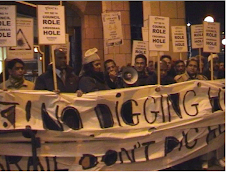
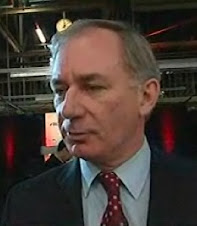




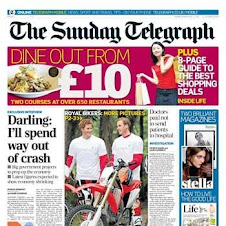



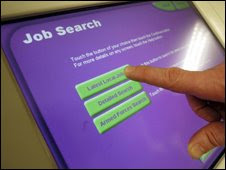
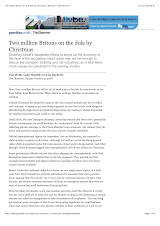
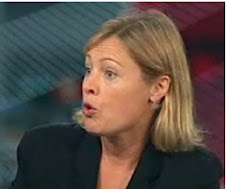




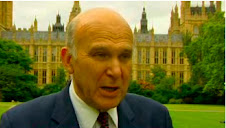
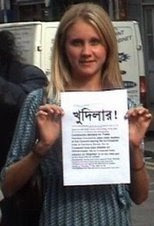
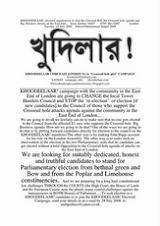

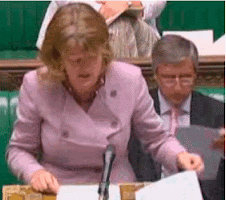




![Khoodeelaar! constitutional law campaign against the 'Crossrail Bill' [a Bill in UK Parliament]](http://2.bp.blogspot.com/_pSmwp9aFK8U/SGqe5VQwLHI/AAAAAAAABfc/MEjjMWby2dc/S226/Khoodeelaar!+try+this+logo.gif)























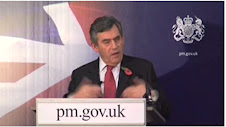

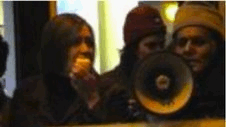
![London [Rupert Murdoched] Times, Wed. 7 May 2008](https://blogger.googleusercontent.com/img/b/R29vZ2xl/AVvXsEitiFRN6uO_MOdYMby0s7ow2zcBaewOKfl3k4QdCPcahu1IKXx6sl7Gs4aO9VrAhN8gQJvYb1a2JnODsTUsMks_LtoZVuqc64whMkMitNKVz1bijPST853uNwRNG8x2PVFl1kqRez8M3b-j/s226/1676149.jpg)















